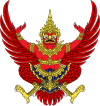The military courts of Thailand (Thai: ศาลทหาร; RTGS: san thahan) are judicial bodies with criminal jurisdiction over members of the Royal Thai Armed Forces and sometimes also over civilians as may be assigned by law, as was the case from 25 May 2014 until 12 September 2016 following the 2014 Thai coup d'état.
Unlike other courts in the judicial system of Thailand, military courts are subject to the Ministry of Defence and are operated by the military's Judge Advocate General's Department.
Procedure
The current procedural law governing the military courts is the Military Court Organisation Act 1955 (Thai: พระราชบัญญัติธรรมนูญศาลทหาร พ.ศ. ๒๔๙๘). The act allows the Judge Advocate General of Thailand (Thai: เจ้ากรมพระธรรมนูญ) to establish court regulations. In wartime or during the imposition of martial law, military courts may adopt special procedures.
Judges
Military court judges (Thai: ตุลาการ) are serving military officers of two types: "general judges" (Thai: ตุลาการปรกติ) and "judge-advocates" (Thai: ตุลาการพระธรรมนูญ). General judges are officers for whom legal training is not a prerequisite. Judge-advocates are trained and accredited in the law.
Structure
According to the Military Court Organisation Act 1955, military courts consist of three tiers: courts of first (trial court), second (appellate court), and third instance (final court of appeal).
| Name | Quorum | Notes |
|---|---|---|
| Military courts of first instance | ||
| Military province courts (Thai: ศาลจังหวัดทหาร) |
|
|
| Military prefecture courts (Thai: ศาลมณฑลทหาร) |
| |
| Bangkok Military Court (Thai: ศาลทหารกรุงเทพ) | Invested with unlimited jurisdiction | |
| Military unit courts (Thai: ศาลประจำหน่วยทหาร) | Established within a military body of no fewer than 1,000 members outside Thailand | |
| Military courts of second instance | ||
| Central Military Court (Thai: ศาลทหารกลาง) |
|
|
| Military courts of last resort | ||
| Supreme Military Court (Thai: ศาลทหารสูงสุด) |
|
|
The act permits the establishment of special military courts, known as war crime courts (Thai: ศาลอาญาศึก), in time of war or during periods of martial law.
See also
References
- ^ "รู้จักศาลทหาร และข้อสังเกตเรื่องเขตอำนาจ". iLaw (in Thai). Bangkok. 2014-05-28. Retrieved 2018-07-07.
- "Military Court in Thailand under NCPO regime". iLaw Freedom of Expression Documentation Center. iLaw. 2015-10-29. Retrieved 12 September 2018.
- Audjarint, Wasamon (2016-09-19). "'No justice in military courts'". The Nation. Archived from the original on September 19, 2016. Retrieved 12 September 2018.
- "Thailand: No New Military Trials of Civilians". Human Rights Watch. 2016-09-13. Retrieved 12 September 2018.
- ^ admin (2014-05-29). "ศาลทหารคืออะไร ? ข้อควรรู้เกี่ยวกับศาลทหาร". news.mthai.com (in Thai). Bangkok: MThai.com. Retrieved 2018-07-07.
